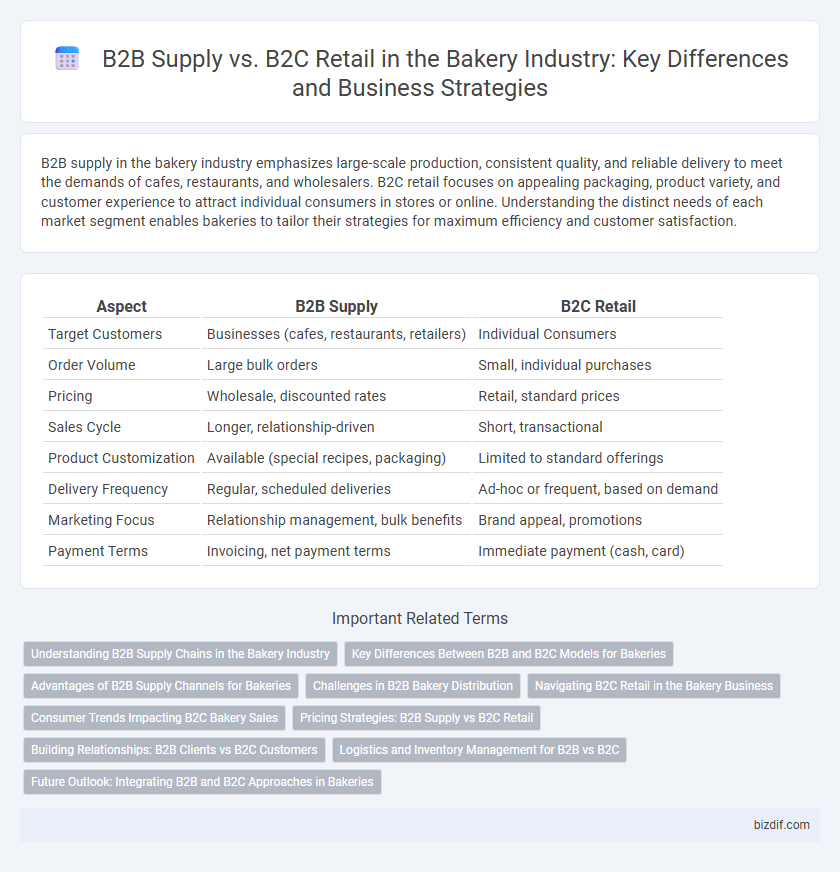B2B supply in the bakery industry emphasizes large-scale production, consistent quality, and reliable delivery to meet the demands of cafes, restaurants, and wholesalers. B2C retail focuses on appealing packaging, product variety, and customer experience to attract individual consumers in stores or online. Understanding the distinct needs of each market segment enables bakeries to tailor their strategies for maximum efficiency and customer satisfaction.
Table of Comparison
| Aspect | B2B Supply | B2C Retail |
|---|---|---|
| Target Customers | Businesses (cafes, restaurants, retailers) | Individual Consumers |
| Order Volume | Large bulk orders | Small, individual purchases |
| Pricing | Wholesale, discounted rates | Retail, standard prices |
| Sales Cycle | Longer, relationship-driven | Short, transactional |
| Product Customization | Available (special recipes, packaging) | Limited to standard offerings |
| Delivery Frequency | Regular, scheduled deliveries | Ad-hoc or frequent, based on demand |
| Marketing Focus | Relationship management, bulk benefits | Brand appeal, promotions |
| Payment Terms | Invoicing, net payment terms | Immediate payment (cash, card) |
Understanding B2B Supply Chains in the Bakery Industry
B2B supply chains in the bakery industry involve large-scale transactions between ingredient suppliers, equipment manufacturers, and bakery businesses, emphasizing bulk orders, consistent quality, and reliable delivery schedules. These supply chains rely on efficient inventory management, supplier relationships, and logistics coordination to meet the high-volume demands of bakery production. Understanding these dynamics enables bakeries to optimize costs, maintain product quality, and ensure timely availability of raw materials for continuous operations.
Key Differences Between B2B and B2C Models for Bakeries
B2B supply in bakeries involves bulk orders, longer contract durations, and customized pricing structures tailored to wholesale clients such as restaurants and retailers. B2C retail focuses on individual consumers with a greater emphasis on product variety, packaging, and in-store experience to drive impulse purchases. Key differences include transaction volume, sales cycle length, and marketing approach, where B2B prioritizes relationship management and B2C targets brand loyalty and customer engagement.
Advantages of B2B Supply Channels for Bakeries
B2B supply channels offer bakeries significant advantages, including bulk purchasing, which reduces costs and ensures consistent ingredient availability. These channels provide streamlined logistics and reliable delivery schedules, enhancing production efficiency. Establishing long-term partnerships with suppliers also allows bakeries to access premium products and negotiate favorable terms, boosting overall profitability.
Challenges in B2B Bakery Distribution
B2B bakery distribution faces challenges such as maintaining consistent product quality during large volume orders and managing complex logistics for timely deliveries to various commercial clients. Supply chain disruptions and fluctuating demand patterns require efficient inventory management and flexible production scheduling. Ensuring compliance with food safety regulations and accommodating diverse client specifications further complicate B2B bakery supply operations.
Navigating B2C Retail in the Bakery Business
Navigating B2C retail in the bakery business demands a strong focus on customer experience, product freshness, and appealing packaging that highlights quality and artisanal craftsmanship. Effective inventory management and personalized marketing strategies, such as loyalty programs and seasonal promotions, enhance customer retention and brand recognition. Leveraging digital platforms for online ordering and social media engagement further boosts direct consumer reach and sales growth in the competitive bakery retail market.
Consumer Trends Impacting B2C Bakery Sales
Consumer trends such as the rise in demand for organic ingredients, plant-based alternatives, and artisanal products significantly impact B2C bakery sales by driving product innovation and menu diversification. The increasing preference for convenience, including online ordering and home delivery, shifts B2C bakeries toward digital engagement and customized experiences. Health-consciousness and sustainability considerations compel bakeries to source ethically and transparently, differentiating their brand in competitive retail markets.
Pricing Strategies: B2B Supply vs B2C Retail
B2B supply pricing strategies in the bakery sector emphasize bulk discounts, negotiated contracts, and cost-based pricing to support large-scale orders and long-term partnerships. B2C retail pricing prioritizes competitive, value-based pricing and promotional offers to attract individual customers and encourage frequent purchases. Understanding these distinct pricing approaches is crucial for optimizing profitability and customer satisfaction in both markets.
Building Relationships: B2B Clients vs B2C Customers
B2B supply in the bakery industry emphasizes long-term partnerships, personalized service, and tailored solutions to meet the unique needs of businesses such as cafes, restaurants, and grocery stores. B2C retail focuses on building trust and loyalty through consistent product quality, engaging customer experiences, and responsive communication with individual consumers. Effective relationship-building strategies in B2B involve frequent collaboration and volume-based agreements, whereas B2C success relies on emotional connection and repeat purchases.
Logistics and Inventory Management for B2B vs B2C
B2B bakery supply chains require precise inventory management to meet large orders with consistent delivery schedules, emphasizing bulk packaging and efficient warehouse logistics to reduce lead times. In contrast, B2C retail focuses on frequent, smaller shipments optimized for shelf turnover, with inventory systems tailored to consumer demand variability and just-in-time replenishment. Advanced logistics software is critical in B2B to coordinate multi-location distribution centers, while B2C leverages real-time tracking to optimize last-mile delivery and minimize stockouts.
Future Outlook: Integrating B2B and B2C Approaches in Bakeries
Integrating B2B and B2C approaches in bakeries drives growth by leveraging bulk supply efficiencies with personalized retail experiences, enhancing customer reach and operational agility. Advanced data analytics and multi-channel strategies enable bakeries to seamlessly manage inventory and forecast demand across both segments. Embracing digital platforms and automation fosters stronger partnerships with wholesale clients while delivering tailored products directly to consumers, shaping a resilient and scalable business model.
B2B Supply vs B2C Retail Infographic

 bizdif.com
bizdif.com